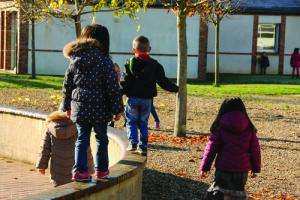Coronavirus recovery package needed for children to prevent "inter-generational crisis"

Published by Professional Social Work magazine - 30 September, 2020
A major report has highlighted how the coronavirus crisis has impacted on children and recommends a comprehensive recovery package.
An estimated 2.4 million vulnerable children were already struggling, including nearly 800,000 children living with domestic abuse and 1.6 million living with parents with severe mental health conditions.
Numbers are expected to rise according to the Childhood in the Time of Covid report and vulnerable children have been placed at risk by the prolonged impact of lockdown and economic collapse.
Figures from the Local Government Association recently showed referrals to children’s social care teams were down 18 per cent during April to June sparking fears of a spike as concerns are identified by teachers and unemployment grows.
Anne Longfield, the children’s commissioner for England, said: “Unless the government acts now, Covid-19 is in danger of becoming an inter-generational crisis, with the impact of the economic fallout on parents determining the future prospects of their children.
“After all the sacrifices children have made over the last few months, we should repay them with a comprehensive recovery package that puts their interests first.”
Suggested measures include:
- Welfare and housing support for families who have built up rent arrears.
- Greater investment in local authority early help services, the Troubled Families programme, and health visitors.
- School funds for vulnerable and disadvantaged children.
- A greater focus on pastoral care and counselling in schools.
- Schools last to close and first to reopen in future lockdowns.
- Children’s centres and family hubs kept open.
- Family visits by social workers and health workers continued where possible.
- Children’s rights and protections upheld.
- Respite services for disabled children and their families protected.
- Children under 12 exempted from the rule of six to allow them to play together.
The commissioner said the rights of the most vulnerable – children in care, custody or with special needs or disabilities – have been ‘actively downgraded at a time when protection should have increased’.
The government temporarily relaxed statutory children’s social care duties in April to help local authorities cope with coronavirus. Most were returned on 25 September, apart from those allowing continued virtual instead of home visits, extended for medical information in fostering and adoption assessments and reduced Ofsted inspections of children’s homes.
The commissioner predicts a widening attainment gap in schools, with children from disadvantaged or vulnerable backgrounds more likely to fall behind.
Longfield said: ‘“Many of the decisions taken over the last six months have not put children first. While pubs, restaurants and non-essential shops opened, the majority of children were not able to attend school.”
Childhood stress
New research published alongside the report highlights worries children have had during lockdown.
Stress Among Children During the Coronavirus Lockdown reveals more than half (55 per cent) of children reported feeling stressed since schools closed in March, with 61 per cent of girls and 48 per cent of boys saying they were stressed and half (49 per cent) saying not being able to see family and friends was a major cause of stress.
Children whose parents were unemployed were more likely to feel stressed (29 per cent) than children whose parents were furloughed (13 per cent).
A quarter (26 per cent) said they were more stressed about their mental and physical health and 41 per cent reported feeling more stressed about schoolwork and exams. However, overall, it appears many children felt less stressed as the lockdown went on.
This article is published by Professional Social work magazine which provides a platform for a range of perspectives across the social work sector. It does not necessarily reflect the views of the British Association of Social Workers.
